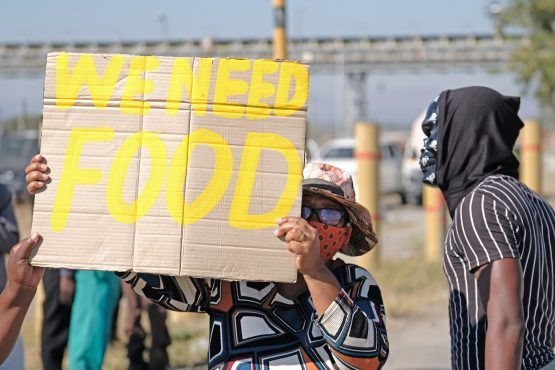
Top stories






More news





ESG & Sustainability
#Sona2026: President announces crisis committee to tackle SA's water challenges









The right to food is enshrined in our Constitution, under sections 27 and 28. Yet, millions of South Africans continue to face abject poverty, endemic hunger and severe malnutrition. The right to food refers to the availability of food, food being accessible, and adequate for everyone without discrimination at all times. Sadly, we have not achieved this in South Africa. In fact, our overall predicament has worsened since the onset of democracy, and, more recently, because of the brutal ramifications of the pandemic.
While hunger and food insecurity are indeed social issues, when implementing solutions to these crucial national problems, we all too often make the mistake of addressing them from a charity perspective. Charity or goodwill, while well-intended and much needed, cannot solve this hugely complex problem on its own.
It was Jacques Diouf, the Senegalese Director-General of the United Nations Food and Agriculture Organisation from 1994 – 2011 who said that “Hunger is not a charity issue, but a social justice issue.” The growing problem of hunger and food insecurity of millions of South Africans is not only unjust but also unsustainable. Martin Luther King aptly put it “Injustice anywhere is a threat to justice everywhere.”
Finding long term solutions to hunger and food insecurity are in the interests of national security, social stability, economic recovery, and nation-building. The rising number of service delivery protests and the devastating July 2021 riots in KZN are clear indications that we can’t live in peace when our neighbours are starving. Neither can we isolate ourselves. People who are starving for long periods of time cannot be truly free, and they are more than likely to threaten the freedoms of others – which makes the right to food a national security issue. Mobilising angry people (especially our youth) without work, without food, without jobs, sitting idly at home, to loot and riot is easy when the right levers are applied.
The South African Human Rights Commission (SAHRC), in their Right to Food Fact Sheet published in November 2020, state that the South African government has signed several international agreements, binding them to ensure that they:
In order to urgently realise the right to food, we need (1) significant policy changes; (2) a more comprehensive and coordinated approach to addressing food insecurity at scale; and (3) explore proven, viable, cost-effective alternatives to food procurement.
From a policy perspective, Bright Nkrumah, in his research paper titled Pandora's box: A legal analysis of the right to food in South Africa (2019) argues that “there is a need to provide policy options and legal clarity on how to enforce the right to food.” He states further that “the slow pace of land reform coupled with poor implementation of the right to food-related interventions, including the poor (and inadequate) provision of social security grants imply that millions of South Africans are still confronted with chronic hunger and undernourishment.”
It is deeply concerning that neither the President’s recent State of the Nation Address nor the Finance Minister’s Budget Speech prioritised detailed food security interventions, which has now become a huge threat to our national security. Hundreds of thousands of non-profit organisations (NPOs) have been providing emergency food relief, stepping in where government services are inadequate or absent. With unemployment rising sharply, and the effects of the pandemic still felt profoundly in poor communities, NPOs are now over-burdened, resource-poor, and unable to cope. Government must consult with the broader NPO sector, and collectively forge a comprehensive set of policies to effectively address food insecurity nationally.
Secondly, while the government does have food security programmes in various departments, such as the Department of Education’s National School Nutrition Programme, and the Department of Social Development’s Food Parcel Programme, these programmes are fragmented, uncoordinated, and are not making the desired impact. Government must form strategic partnerships with NPOs that have the capacity to address food insecurity at scale and provide them with the necessary funding to do so – because the government can’t.
Thirdly, while an estimated 30 million people are food insecure in South Africa, according to the CSIR’s May 2021 Technical Report on Food Losses and Waste, over 10 million tons of food throughout the supply chain is lost or wasted annually. This accounts for a shocking one-third of all the food produced in South Africa, which is an enormous wasted opportunity. Several NPOs in South Africa are addressing food insecurity using good quality, within date, edible surplus food recovered from the supply chain before it is lost or wasted. Most notably among them is FoodForward SA, the largest food redistribution organisation in South Africa. Their food recovery model, known as FoodBanking, is an internationally recognised cost-effective food security solution.
Several studies have shown that food insecurity is associated with higher healthcare costs, due to limited access to nutritious food and the resultant chronic diseases. This also impacts our economy. Therefore, in the long term, the cost of not urgently realising the right to food is greater than the cost of doing so.
Martin Luther King said, “I have the audacity to believe that people everywhere can have 3 meals a day for their bodies, education and culture for their minds, and dignity, equality, and freedom for their spirits.”
Throughout March we commemorate and celebrate our human rights, such as the right to life, freedom, and dignity, culminating on the 21st of March, which is Human Rights Day. Let’s prioritise the right to food, so that the most basic of human rights, and the very first of Maslow’s Hierarchy of Needs, can be realised with urgency.
